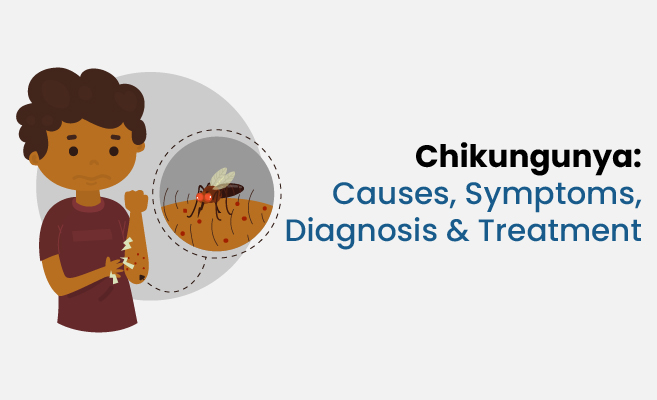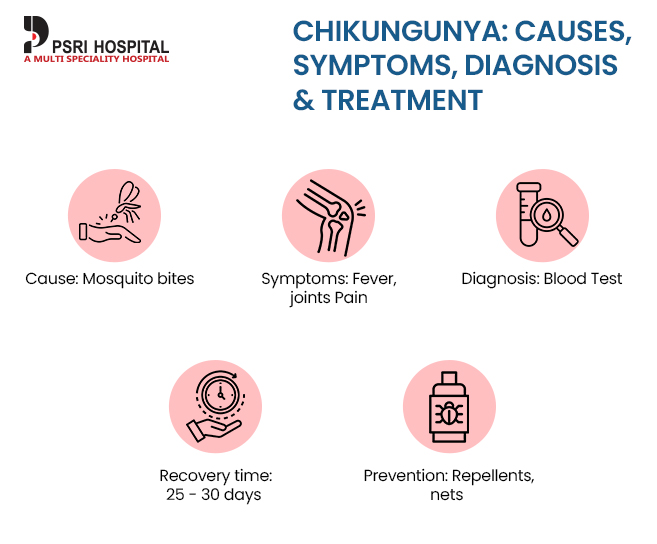Chikungunya: Causes, Symptoms, Diagnosis & Treatment

In a world where health threats constantly evolve, Chikungunya has emerged as a significant concern in many tropical and subtropical regions. This mosquito-borne viral disease, while not often fatal, can disrupt daily life with debilitating symptoms. What makes it noteworthy is the speed at which it spreads and the lingering discomfort it can cause. Understanding the Chikungunya causes, symptoms, and treatment options is crucial for prevention and recovery.
In this detailed guide, we’ll explore every aspect of this illness—from its origins to the best strategies for treatment and prevention. Whether you’re seeking clarity on Chikungunya diagnosis or wondering about Chikungunya recovery time, this article provides an insightful overview tailored for all readers.
What is Chikungunya?
Chikungunya is a viral disease caused by the Chikungunya virus (CHIKV), transmitted primarily through the bites of infected Aedes aegypti and Aedes albopictus mosquitoes. The disease is often mistaken for dengue due to overlapping symptoms, but its impact on joints and prolonged recovery period sets it apart.
Chikungunya Causes:
The primary Chikungunya cause is the bite of a mosquito infected with the virus. Let’s break down the key contributors:
- Infected Mosquitoes: Aedes mosquitoes become carriers after feeding on an infected person and can transmit the virus during subsequent bites.
- High Mosquito Population: Areas with stagnant water and poor sanitation foster mosquito breeding.
- Travel to Endemic Regions: Visiting or residing in areas with active outbreaks increases the risk.
Understanding these causes is essential to curb the spread of the disease.

Chikungunya Symptoms:
Chikungunya symptoms typically appear 2-7 days after being bitten by an infected mosquito. The symptoms can range from mild to severe, impacting daily activities.
Common Symptoms:
- Sudden high fever
- Severe joint pain, especially in the wrists, knees, and ankles
- Muscle pain
- Skin rash
- Headache
- Fatigue
Severe Cases:
In rare instances, symptoms may persist for months, leading to chronic arthritis-like conditions. Individuals with compromised immunity, the elderly, and newborns are at higher risk of severe complications.
If these symptoms emerge, seeking immediate care at a 24 hours emergency hospital near me is vital for timely intervention.
Chikungunya Diagnosis:
Accurate Chikungunya diagnosis is key to managing the disease effectively. Diagnosis involves clinical evaluation and laboratory tests to confirm the presence of the virus.
Common Diagnostic Methods:
- Physical Examination: A healthcare professional examines symptoms such as fever and joint pain.
- Blood Tests:
- RT-PCR (Reverse Transcriptase Polymerase Chain Reaction): Detects the presence of viral RNA.
- Serological Tests: Detect antibodies (IgM and IgG) against the Chikungunya virus.
Timely diagnosis ensures a targeted approach to treatment. Hospitals like PSRI, one of the top 10 hospitals in Delhi, offer advanced diagnostic facilities for efficient detection.
Chikungunya Treatment:
Currently, there is no specific antiviral treatment for Chikungunya. The focus remains on relieving symptoms and supporting recovery.
Effective Management Strategies:
- Pain Relief: Over-the-counter medications like paracetamol or ibuprofen help reduce fever and joint pain.
- Hydration: Drinking plenty of fluids combats dehydration caused by fever.
- Rest: Adequate rest allows the body to heal faster.
- Supportive Care: In severe cases, hospitalization at a super speciality hospital in Delhi may be required for intravenous fluids and monitoring.
Patients should avoid aspirin as it can exacerbate bleeding risks in cases mistaken for dengue.
Chikungunya Recovery Time:
The Chikungunya recovery time varies based on the severity of the infection.
- Acute Phase: Symptoms usually subside within 10 -15 days.
- Prolonged Symptoms: Joint pain may persist for weeks or even months, resembling rheumatoid arthritis.
Seeking care at the best hospital in New Delhi ensures access to comprehensive post-viral management plans.
Chikungunya Prevention:
The adage “prevention is better than cure” holds especially true for Chikungunya. Taking proactive steps can significantly reduce the risk of infection.
Preventive Measures:
- Eliminate Breeding Grounds: Regularly empty water containers, flower pots, and other mosquito-prone areas.
- Use Mosquito Repellents: Apply repellents containing DEET or picaridin.
- Wear Protective Clothing: Opt for long-sleeved shirts and trousers.
- Install Mosquito Nets: Sleeping under treated mosquito nets provides an additional layer of protection.
- Vaccination: While there’s no vaccine for Chikungunya yet, ongoing research shows promise.
Comprehensive preventive strategies are vital, especially in urban areas like Delhi, where mosquito breeding is prevalent.
Chikungunya in the Delhi NCR Region:
With its dense population and tropical climate, Delhi NCR is particularly vulnerable to mosquito-borne diseases. Choosing a healthcare provider equipped with the latest diagnostic and treatment facilities is crucial. Institutions like PSRI Hospital, recognized among the top hospitals in Delhi NCR, offer end-to-end care for infectious diseases, from diagnosis to recovery support.
Why Choose PSRI Hospital for Chikungunya Care?
PSRI Hospital is a leading super speciality hospital in Delhi, known for its expertise in treating infectious diseases. Here’s what makes PSRI a preferred choice:
- 24/7 emergency services with advanced diagnostic support
- Dedicated departments for infectious disease management
- Skilled healthcare professionals experienced in managing Chikungunya cases
- Comprehensive rehabilitation programs to address prolonged joint pain
For anyone searching for the best hospital in Delhi for Chikungunya care, PSRI Hospital ensures world-class treatment tailored to individual needs.
Conclusion!
Chikungunya, though rarely fatal, can leave a lasting impact on your health and well-being. By understanding the Chikungunya causes, symptoms, and preventive measures, you can protect yourself and your loved ones from this debilitating disease. Timely diagnosis and effective treatment are crucial for recovery, and choosing the right healthcare facility makes all the difference.
Don’t let Chikungunya disrupt your life. At PSRI Hospital, we combine cutting-edge technology and compassionate care to ensure your recovery is smooth and swift. Contact us today to learn more about our services and safeguard your health for the future. Your journey to wellness starts here!
Frequently Asked Questions:
What are the main causes of Chikungunya?
Ans. Chikungunya is primarily caused by the bites of infected Aedes aegypti or Aedes albopictus mosquitoes.
What are the early symptoms of Chikungunya?
Ans. Sudden fever, severe joint pain, rash, and fatigue are common early symptoms of Chikungunya.
How is Chikungunya diagnosed?
Ans. Diagnosis is done through clinical evaluation and laboratory tests like RT-PCR or serological antibody tests.
What is the typical recovery time for Chikungunya?
Ans. Recovery usually takes 10 -15 days, but joint pain may persist for weeks or months in severe cases.
How can Chikungunya be prevented?
Ans. Prevent Chikungunya by eliminating mosquito breeding grounds, using repellents, wearing protective clothing, and sleeping under nets.

 Book An Appointment
Book An Appointment Virtual Consultation
Virtual Consultation





